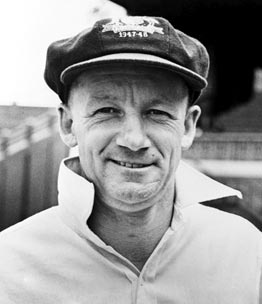Get Today in Masonic History into your Inbox. Sign up today for one of our email lists!
Need an article for your Trestleboard/Newsletter see our Use Policy
Donald George "Don" Bradman passes away

Today in Masonic History Donald George "Don" Bradman passes away in 2001.
Donald George "Don" Bradman was an Australian cricket player.
Bradman was born on August 27th, 1908 in Cootamundra, New South Wales, Australia in the home of a local midwife. As a young man he practiced batting incessantly in his youth. He invented a one man version of cricket where he used a golf ball and a cricket stump. Bouncing the golf ball against a wall in the families backyard he was able to practice his speed and agility. At the age of twelve he hit his first century, 100 runs, while playing for Bowral Public School.
Around 1921, Bradman's father took him to Sydney Cricket Grounds where the fifth Ashes Test match was being played. The Ashes is in reference to an ongoing series between England and Australia which began in the 1882 - 1883 season. When England lost to Australia. A English sports writer declared English Cricket dead and the ashes were being taken to Australia. While at the match, Bradman made a declaration to his father wasn't going to stop until he played on the pitch at Sydney Cricket Grounds.
In the 1927 - 1928 season, Bradman made his first class, the highest standard of cricket either international or domestically, appearance for the New South Wales team. He was nicknamed the "the Boy from Bowral" after the town he was living in. He also played Test cricket which is the longest form of cricket and the most challenging. It was something of a shock for Bradman and initially he had some issues adjusting. His issues on the new level were short lived and he began to be a well recognized player both in Australia and in England.
During the 1934 Tour of England, Bradman fell ill. Eventually it was diagnosed as appendicitis. During the surgery he lost a lot of blood, he was on the operating table for four hours. Peritonitis set in and, especially at the time, the prognosis was not good. King George V requested constant updates on Bradman's condition. Bradman's wife began the month long journey to England as soon as she was informed. On her way to England she received word, incorrectly, her husband passed away. A quick phone call clarified the situation. By the time Mrs. Bradman had reached England he made his recovery. On doctors recommendations he missed the entire next season.
In 1940, Bradman joined the Royal Australian Air Force (RAAF). When it was discovered there were too many recruits to train, Bradman was encouraged by the Governor-General of Australia to switch to the Army. Bradman was criticized for the move as it was deemed "safer" for him. During his time in the military it was determined Bradman had poor eyesight, which did not seem to effect his efforts on the Cricket Pitch and he was diagnosed with fibrositis, more commonly called Fibromyalgia. The pain he continued to have during his time on the Cricket pitch, Cricket for all teams did not continue until after 1945, was described by him as "painstaking".
Bradman retired from Cricket after the 1947-1948 season. He went out on top with his Australian team being nicknamed the Invincibles after they won the Ashes 4-0.
In 1997, Bradman's wife passed away. This sent him into what was described as "a discernible and not unexpected wilting of spirit." In 2000 he developed pneumonia and was hospitalized until December. After he returned home he passed away on February 25th of 2001.
Bradman was a member of Lodge Arcadia No 177 in Sydney, New South Wales.
This article provided by Brother Eric C. Steele.

